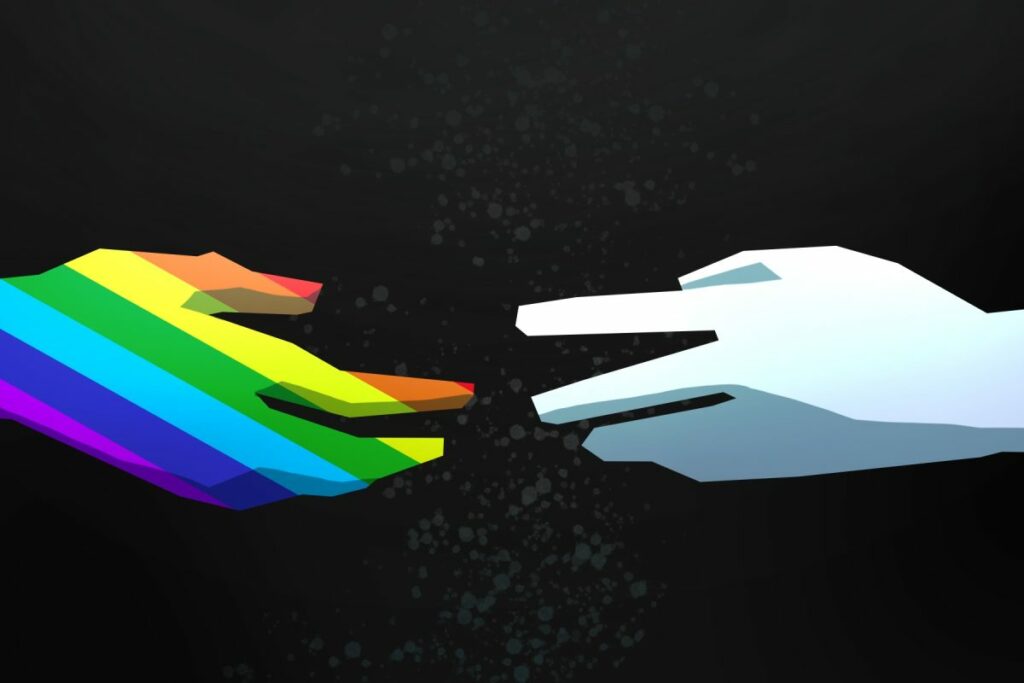This story is syndicated from The Black and White, the newspaper of Walt Whitman High School in Bethesda, MD. The original version of the story ran here.
As I make the final adjustments to my makeup and put my eyeliner down, I look up at my reflection in the mirror. Feelings of pride rush through my body as I admire the rose-pink blush that seamlessly blends into my light beige foundation and sharp, black eyeliner. For the first time, I feel like myself. Suddenly, the front door swings open, and my parents’ voices fill the hallway. I frantically scrub off my makeup, and the familiar feeling of despair consumes me again.

I first noticed that I was “different” in elementary school. When my guy friends started talking about girl crushes and asked me who I liked, I would say it “was a secret.” My gaze wasn’t on any girls, and it never had been. The more I lied about my crushes, the more frustrated I became with myself.
Why couldn’t I just like girls? What was wrong with me?
Entering middle school, my heart finally fixated on someone. This person had short, jet-black hair, an energetic personality, and a smile that always caught my eye. Developing a crush filled me with newly-found excitement, and I replayed every interaction with the person in my head, no matter how insignificant. After avoiding the question for so long, I could finally tell my friends about a crush. There was only one issue: my crush was a boy.
I never thought I was gay, but the realization soon set in with an intense dread. Thinking about my parents’ opinions and whether my sexuality would change their perceptions of me was petrifying, so I started to play a character for them. I was outgoing and flamboyant with my friends, but when I was with family, I reined in my energy and presented a dull shell of myself. I had no reason to believe that my family would be unaccepting of my sexuality, but I believed a model child should be well-behaved, passive and, most importantly, not gay. So I suppressed myself, worried that acting too loud or confident would make me a failure in their eyes.
The hostile national conversation on LGBTQ+ rights contributed to my self-suppression. In 2023, record amounts of legislation designed to curtail LGBTQ rights endangered the health of queer youth across the nation. Now in 2024, the election year is set to once again turn an entire community into a political bullet point, forcing queer youth to conceal their identity in fear of political ostracization.
The character I created started taking over my life as I emotionally distanced myself from my parents. When the pandemic hit, feelings of seclusion grew even stronger as I was forcibly surrounded by my family. My friends became my main support outlet: I called them every night for hours on end to escape the confines of my emotional isolation.
During this time, videos from various queer content creators started to fill my YouTube recommended feed. Every day, I watched people like myself document their everyday lives, from beauty routines to personal stories about their sexual orientation. Seeing others freely express their sexuality empowered me to explore mine.
I began by experimenting with makeup and nails behind closed doors. In these moments, I caught a glimpse of what it could be like to live freely and true to myself, but I still harbored feelings of shame and embarrassment as I continued to conceal my identity from my parents. I had accepted that I was never going to be proud to show them who I was.
My mindset persisted until freshman year when I began to meet different groups of people in person for the first time since the pandemic. Throughout my life, I believed that being gay was synonymous with being an outcast, but as I got to know other queer students, I felt a sense of belonging. The people surrounding me embraced their sexuality without restraint, which helped me realize that my sexual orientation wasn’t something to hide or suppress — it was just another form of self-expression.
But beyond forming new bonds with people at school, I still needed to open up to my parents. I began to converse with them about topics separate from sexuality and focused on building an honest relationship. Becoming transparent with my parents allowed me to break down the character that drove a wedge in our relationship. I grew comfortable expressing myself freely as the outgoing, flamboyant person I knew I was. When I put up my first pride flag in my room following the 2023 D.C. Pride Festival, I knew my family wouldn’t treat me any differently if they saw it — an idea I previously couldn’t fathom.
Given the extreme tensions that remain in the country, we must create and promote spaces for the queer community to come together and express their emotions honestly, as succumbing to political institutions’ anti-LGBTQ beliefs will only further isolate us in fear and insecurity.
For years, I let that fear and insecurity over sexuality isolate me from developing a deep connection with the people I love the most. No matter how I choose to express myself, we are still family — a bond that my sexual orientation will never break.



